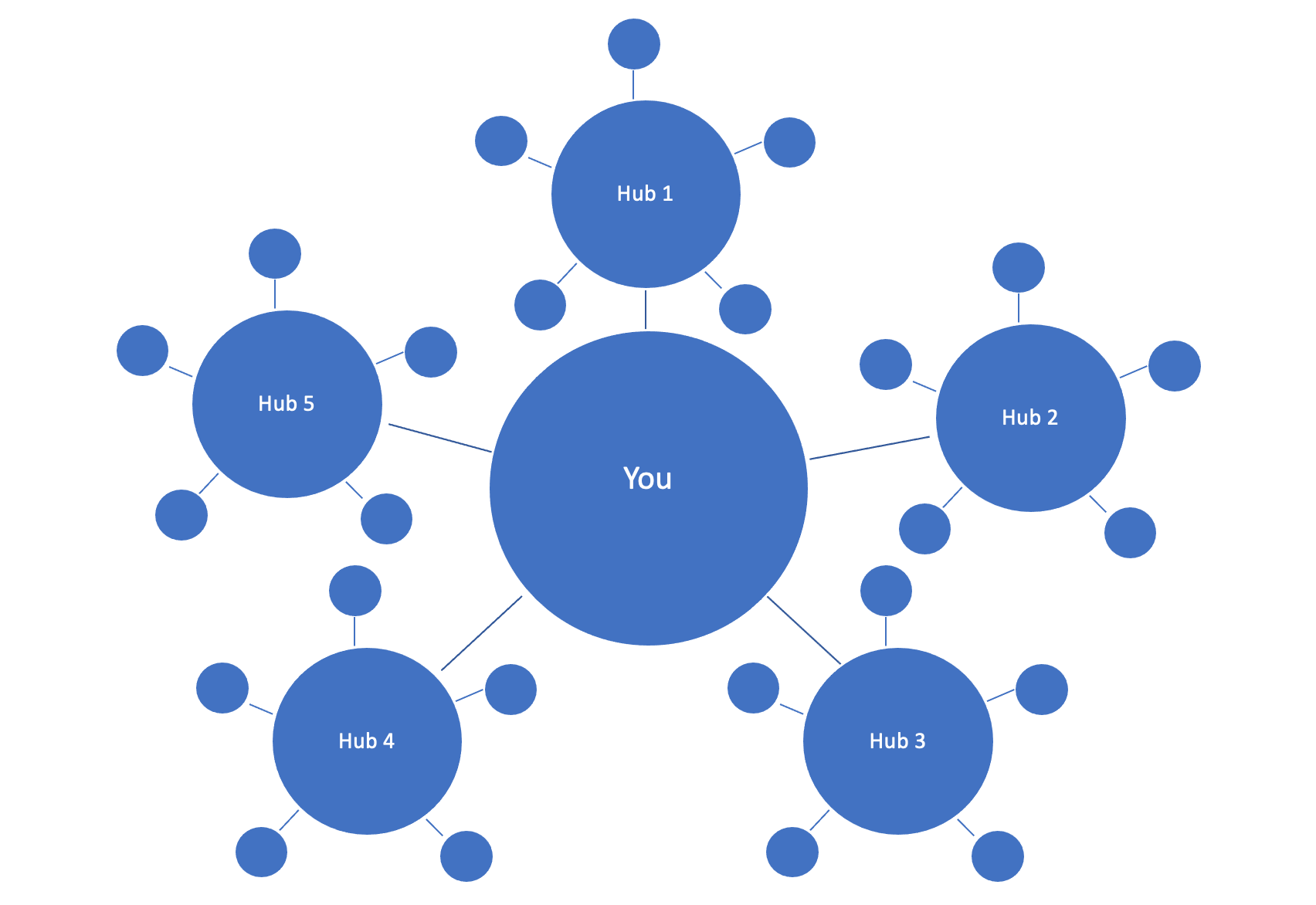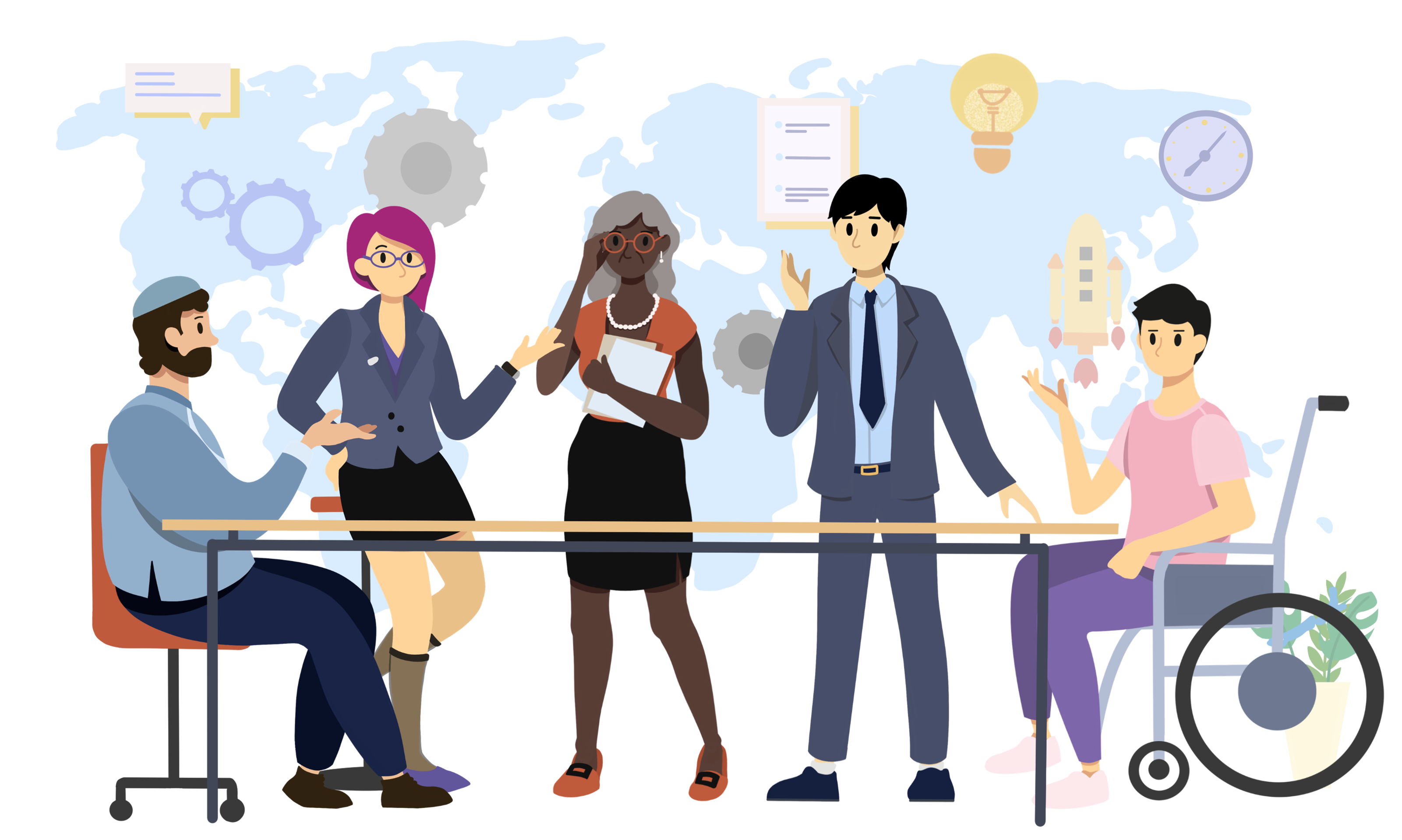Building Your Net Worth With Inclusive Relationships
“Your Network is Your Net Worth.” Beyond being the title of a book, it’s a powerful truth that I have come to fully appreciate as I’ve reflected on the importance of meaningful and different relationships which position each of us for success – however personally defined and regardless of your background.
It’s been nearly two decades, yet I still remember sitting in class at Harvard Business School and staring intently at a graphic similar to the one below. It illustrates how a network of five hubs (of different expertise, demographics, or social/professional affiliations) is much more powerful and expansive than a network of five connections within one singular hub. By connecting with the five different hubs, you can potentially access all of the connections of those individual hubs too! (So, in the graphic below, you would have access to thirty instead of just five connections.)

What does this have to do with inclusion and ultimately your net worth? Everything!
Developing an expansive and inclusive network of people of different backgrounds, who effectively represent disparate “hubs”, provides greater access to future career and business opportunities, subject matter expertise, innovative ideas, different perspectives, supportive allies, and other resources… all of which can enhance your net worth and position you for success.
Here are three ways to build inclusive relationships that can fuel your professional and personal success:
1. Cast a wide net by intentionally meeting people who are different from you
Anyone can be your ally and, likewise, you can be anyone else’s ally.
While it is natural for us to be most comfortable with people who are like us, we need to stretch ourselves beyond our comfort zones and embrace difference with excitement. Having grown up in New York City’s Chinatown, an insular community, I had limited exposure as a child to people of other backgrounds. In my travels, work, and everyday life, I have had to be very intentional about meeting people who are not like me – not just in terms of primary diversity (such as race/ethnicity or gender) but also in terms of secondary diversity (such as expertise, beliefs, education, or socio-economic background). When I look back at my corporate career and entrepreneurial journey, it’s striking how many of my most important sponsors and allies have been very different from me in notable respects.
What I have often discovered is that, while we may be different, there is almost always a way that we connect or relate to each other – as long as we’re open and attuned to discovering those commonalities. What we have in common (e.g., values, interests, and goals) often becomes the foundation for meaningful relationships where we value and respect what we each bring to the table.
2. Focus on building your relationship capital within your expansive network
A wise mentor has reinforced to me, “You don’t build a bridge the day you need it.” Beyond just meeting people, it is important to maintain, develop, and nurture relationships within your network. Meaningful relationships are built on commonalities, respect, and an earnest desire to help each other to succeed. This means not being laser-focused on how you can immediately benefit from a relationship. Instead, think proactively about how you can be helpful to others (which can be high-impact without requiring much of your time). For example, I love to connect others who would benefit from knowing each other. Bringing others together strengthens your network and also makes you more valued and appreciated. Ultimately, this helps you to build your “relationship capital”, should you ever need to leverage these relationships in the future.
At the end of the day, it’s not about being too calculated or scientific. It’s about being genuinely interested in others and building authentic relationships. You will find yourself surprised at how relationships come back to help you in ways you never expected. Building that bridge before you need it provides you with a ready network of allies with different strengths, perspectives, and spheres of influence to help you to accomplish more than you are capable of on your own.
3. Be mindful of how inclusively you behave
Admittedly, until I co-founded TAIQ (“Think Act Interact Quotient”) and dug into the research, I did not fully appreciate what it means to be truly inclusive – what key behaviors could help us all be even more effective in building and strengthening the relationships which constitute our networks. What TAIQ has found is that being “inclusive” effectively boils down to eight key behaviors of being: open; aware; culturally competent; unbiased; curious; collaborative; courageous; and performance/goal oriented.
Behaving inclusively requires mindfulness and intentionality. Based on the data gathered, it is evident that how we “think” does not necessarily manifest itself in how we “act” and “interact”. Further, we often see ourselves as being more inclusive than how others view us. So, it benefits us all to be more mindful of how we behave as it ultimately impacts our ability to build relationships.
Inclusive relationships help us to build the supportive network we need to tackle professional and personal challenges that come our way. By including, respecting, and valuing one another for what each of us brings to the table, we can conquer anything. We can build our individual and collective net worth together.
So, no matter who you are, you have a vested interest in building inclusive relationships. There’s a personal business case for each of us. Inclusive relationships help us to succeed and build our net worth.
What’s in it for you? Everything!
____________________________________
Take a couple minutes to answer some quick questions on success and inclusion: https://www.surveymonkey.com/r/SuccessandInclusion
Self-reflection is also the first step to building more inclusive relationships at work. Click here to take your free TAIQ self-assessment and to learn more about the eight key behaviors that define inclusion: https://www.surveymonkey.com/r/TAIQSelfandColleague


